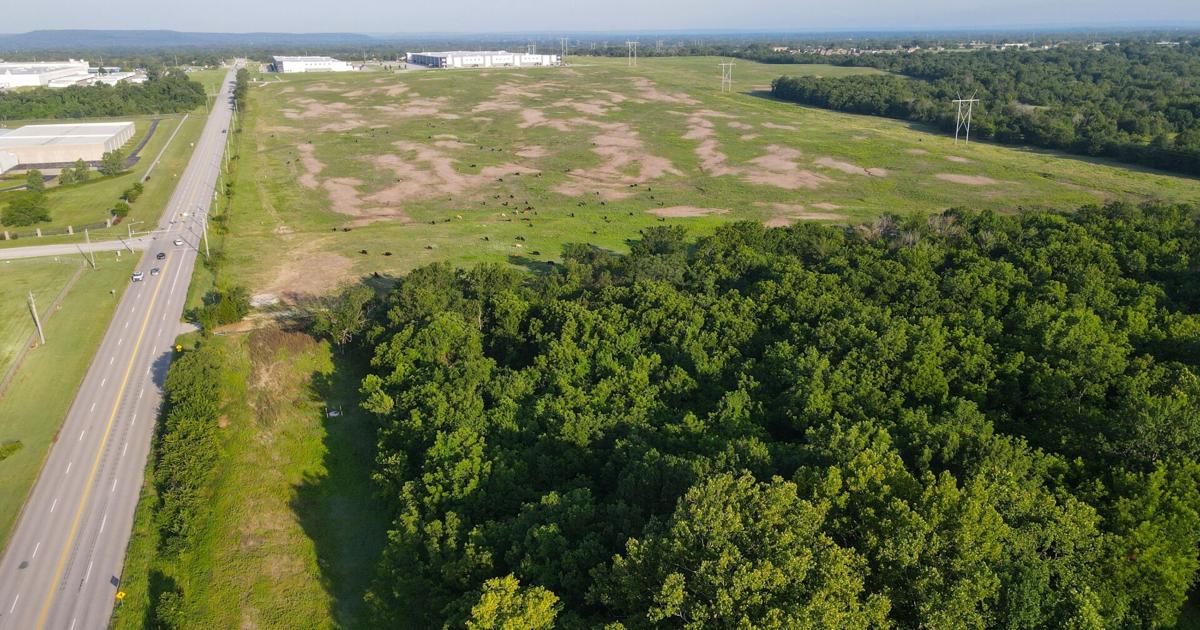
Kevin Canfield
Tulsa World Reporter
Get email notifications on {{subject}} daily!
Your notification has been saved.
There was a problem saving your notification.
{{description}}
Email notifications are only sent once a day, and only if there are new matching items.
Followed notifications
Please log in to use this feature
Log In
Don’t have an account? Sign Up Today
Project Clydesdale, a data center complex planned for construction on 400 acres of unincorporated Tulsa County land north of Cherokee Industrial Park, took three major steps toward the start of construction Monday.
The Board of County Commissioners voted 3-0 to approve the data center’s project plan, which lays out the basic elements of the multibillion-dollar investment, and also approved the creation of tax increment financing districts to help fund it.
Less than an hour later, the Tulsa City-County Library Commission unanimously approved a resolution supporting the tax incentive agreement.
The library system was the last of six taxing entities required to approve the agreement. The other taxing entities party to the agreement are Owasso Public Schools, Tulsa Technology Center, Tulsa Community College and Tulsa County Health Department.
After the vote, County Commission Chairman Lonnie Sims thanked all those involved in the process — including residents who had taken the time to question the merits of the project.
“I’m grateful that we have companies that are willing to look and make this kind of investment, but also think we sent a message that we’re going to ask some tough questions and we’re going to vet these projects,” Sims said.
Like the other massive data center in the works locally, Project Anthem, it remains unclear who the end user of Project Clydesdale will be.
The developer of the project has been listed as Beale Infrastructure, a firm that specializes in the construction of data centers, but the developer that signed off on the project plan and tax incentive agreement was Delaware-based Quartz Mountain Properties LLC.
The project plan approved Monday calls for constructing at least one data center and as many as four, each of which would be approximately 200,000 square feet.
Construction of the first data center is expected to begin this fall and be completed in about a year and a half, according to a spokesperson for Beale Infrastructure.
Under the terms of the tax incentive agreement, the developer will not have to pay property taxes for 25 years, beginning the year after the data center is issued a certificate of occupancy.
In agreeing to forgo receipt of the property tax collections based on the increased value of the land, the taxing entities will receive a total of $1.5 million annually. The payments in lieu of taxes (PILOT) are based on the percentage of the overall millage rate each taxing entity receives.
After the first annual payment, the PILOT disbursements to each taxing entity will increase by 1% annually.
As each phase of the project is completed and a new PILOT program established, the $1.5 million will be adjusted to reflect changes in the consumer price index. The property on which Project Clydesdale is to be built currently has an assessed value of less than $1,000.
In addition, during the 25-year life of the tax incentive agreement, Tulsa County will receive an annual $500,000 community investment payment to be used for road construction.
The annual PILOT disbursement and the community investment payment total about $6.65 million, more than any other business pays in property taxes annually, according to Tulsa County.
Before casting their votes, commissioners spent 45 minutes hearing from supporters and opponents of the project and the tax incentive agreement.
Owasso Public Schools Superintendent Margaret Coates said the project would provide short- and long-term benefits to students.
“First, at its heart, this project represents opportunity,” Coates said. “The financial impact alone would significantly expand the resources available to our schools.
“These additional funds would allow us to strengthen classroom instruction, keep our class sizes small, enhance technology and provide even more of the tools our students need to succeed.”
Justin McLaughlin, executive vice president and chief operating officer of the Tulsa Regional Chamber, said data centers already have a proven track record of spurring economic development in the area.
“Fleming Construction is active in multiple data center projects. Likewise, Manhattan Construction is also busy with a lot of large-scale data center projects,” McLaughlin said. “Greenheck, which we recruited here about seven or eight years ago, has over 700 employees, and they manufacture air movement control and air conditioning products that are used in data centers.
“AAON, one of our huge employers here, a major HVAC and air-movement equipment manufacturer, also serves data centers.”
Project Clydesdale proponents have noted that each phase of the project represents a $700 million private investment that would put many local electricians, construction workers and other tradesmen to work during the construction process.
During the BOCC meeting, two speakers questioned why the developer could not commit to putting those requests in writing — at least 30% of construction hours for local workers and 20% for local apprentices.
“You are asking the citizens to offer these folks 25 years (of incentives), and then a new project starts, and then 25 years, and then a new project starts at 25 years going out, and not setting any conditions,” said Jeremy Griffin, an assistant business manager for the International Brotherhood of Electrical Workers Local 584.
Taylor Brown, director of delivery for Beale, told commissioners that the company has made an effort to “memorialize those (numbers) to the best of our ability” in a memorandum of understanding but has not heard back from local labor business managers.
“We have made promises or, our commitments to meeting as best we can local hiring to commercial best efforts,” Brown said.
Asked by Sims why the developer could not commit to a certain percentage of local workers, Brown said “we don’t want to get into a position where we are putting ourselves at commercial risk of not being able to deliver without a guarantee of what the market can deliver.”
kevin.canfield@
tulsaworld.com
Get Government & Politics updates in your inbox!
Stay up-to-date on the latest in local and national government and political topics with our newsletter.
* I understand and agree that registration on or use of this site constitutes agreement to its user agreement and privacy policy.
Kevin Canfield
Tulsa World Reporter
Get email notifications on {{subject}} daily!
Your notification has been saved.
There was a problem saving your notification.
{{description}}
Email notifications are only sent once a day, and only if there are new matching items.
Followed notifications
Please log in to use this feature
Log In
Don’t have an account? Sign Up Today



